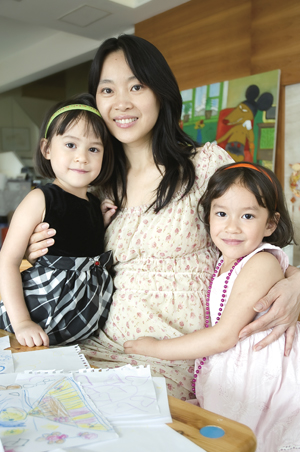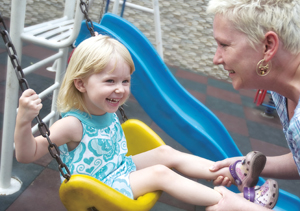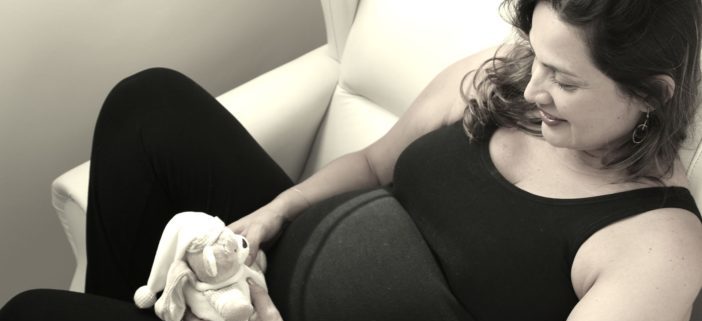This first appeared on our blog in 2010, but we think this issue is still very relevant for many current beijingkids readers. What issues do you face in being or becoming a mother later than “society expects”? Comment below.
 Moms can spend hours browsing stores picking out the perfect pair of pajamas, the perfect bottle and the perfect mobile to hang above the crib. But ask them to name the perfect age to have a child, and they probably couldn’t give you an answer.
Moms can spend hours browsing stores picking out the perfect pair of pajamas, the perfect bottle and the perfect mobile to hang above the crib. But ask them to name the perfect age to have a child, and they probably couldn’t give you an answer.
The Golden Age
Doctors and psychologists have an equally hard time pinpointing the best time for women to have children. Some say it’s as early as the late teen years, when the body is physically prepared to deal with the tolls of pregnancy, while others will claim that the late 20s are the golden period to ensure emotional stamina. Statistically, the age of first-time moms is on the rise. According to the US National Center for Health Statistics, the average age of first-time mothers in the US has jumped from 21 in 1970 to 25 in 2005. The UK Office of National Statistics reports a similar increase in the average age of first-timers, rising from 26 in 1971 to 29 in 2005.
“It depends on what type of person you are as to when the best time is,” says Alison Thompson, mother and marketing director at 3e International kindergarten. Thompson (37) divides her time between her job and her three-year-old son Milo, and believes that youth does have its advantages. “Speaking as an older mother, I would certainly have had more energy in my 20’s than I do now!”
Those who wait, whether intentionally or not, will likely need to hurdle past red flags on the Internet from clinics that cite devastating pregnancy complications. However, women can increasingly count on fertility tests and new technologies to help them bypass once formerly insurmountable obstacles.
It all seems to come down to weighing the options. Thompson says having kids later does include the bonus of increased financial stability, as well as a long list of life experiences that can give older moms the tools they need for raising a child.
Not everyone, however, can draw up a list of pros and cons before making the decision to have a baby. For some, it’s about waiting for the right partner to come along.
The Advantage of Years
Carol Chow didn’t meet Bill Bishop until her mid-thirties, after moving to Beijing, and it was several years later before they decided it was the right time to have children. At 39, Chow gave birth to twins: Kiran and Ariel. Now 42, Chow says she rarely considers her age when juggling motherhood and her new business.
While some women daydream about motherhood early in life, Chow says she barely thought about it. It wasn’t until the age of 32 that she recalls an urge from Mother Nature to have children. However, she maintains that having kids were only ever an option if the right person came along. Her family didn’t seem to mind or think Chow’s impassive outlook was anything unusual.
Chow says that after she married, becoming a mom quickly was important if she was to avoid Down syndrome, other birth defects and autism. The failed attempts of her friends to get pregnant prompted her even further, but luckily, Chow herself had no difficulties conceiving.
Chow believes age has given her more patience and less financial stress. “I have the freedom to not work for a few years and just be at home,” says Chow. “It’s also, in some ways, a little easier in China because you can get help and that makes a big difference. You’re not as tired all the time.”
Beijing moms who become pregnant in their late 30s might stand out to traditional locals who believe that when it comes to having kids younger is better. Chow says that despite their views, she thinks her age has had a positive effect on how she raises her children.
“I see them more as individuals now, versus if I had them when I was younger, I would think of them more as children.”
Focusing on bringing out Kiran and Ariel’s inner passions is what drives Chow, while she avoids thinking about how old she’ll be when they reach a certain age. In Chow’s mind this interferes with her objective: “To raise healthy children to become healthy people.”
 Young at Heart
Young at Heart
Helen Stromme, a Norwegian native, not only considers her age of 42 to be insignificant in regards to her 3-year-old daughter, she doesn’t worry about her son’s age either. At the age of 23, Stromme had her first child, Kim, and found herself cooped up at home alone with his colic-driven cries caused by a then undiagnosed hip injury he sustained during labor.
“This nightmare went on for three months,” says Stromme. “I think I was behaving really badly at the doctors’ office [which]forced them to do something [about my son’s crying]. Luckily everything was taken care of. He had a scan and [we]found out about his hip. He stopped crying. I was able to sleep.”
Stromme’s difficult introduction to motherhood was made worse by her battle with postnatal depression. “When I’d wake up and see him sleeping, I’d sit there with my hands in my lap thinking, ‘What am I going to do now?’”
Later, Stromme lived life as a single mom, learning the ins and outs of parenthood along the way. It wasn’t until she met her husband Terje and moved to Beijing that she considered having another baby.
Determining whether to do it all a second time wasn’t easy at first. Stromme recognized that she was getting older, and already had 13 years of motherhood behind her. Yet, Stromme also felt her now stable life with a man whom she believed would make a wonderful father, had the makings of a perfect family.
For round two, Stromme told her husband to watch out for signs of depression. But her worries were groundless, and the pregnancy wentsmoothly. Her doctor recommended that she undergo an amniocentesisto test for any fetal abnormalities. Thankfully, the results were negative. “I felt more secure,” recalls Stromme, adding that she was able to get in touch with “what it was actually like to be pregnant.”
Like Chow, Stromme finds herself with plenty of free time for her daughter Mimi. She now practices Gestalt psychotherapy from her home and is able to reserve extra hours to play and observe her daughter’s growth, a benefit she didn’t have with her son.
Stromme even enjoys playing “dolls” with her daughter and says she’s intent on acting and feeling as childish and as young as she wants, “I’m 42; sometimes I feel like I’m 24.” Stromme says 46-year-old Terje shares her youthfulness and becomes “lost completely” when playing with Mimi.
For other women, Stromme has some words of advice: “You can be working a lifetime but at the end of the day you are a parent and you can learn a lot from that.”




